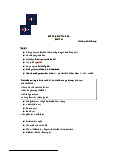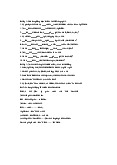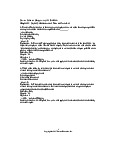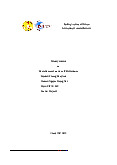






Preview text:
CHUYÊN ĐỀ 9: CÂU BỊ ĐỘNG (PASSIVE VOICES) I. LÍ THUYẾT 1. Cách chuyển
Chủ động (Active): Subject + Verb + Object
Bị động (Positive): Subject + Verb + by Object (tobe + V-ed/ V3)
Ex: They planted a tree in the garden. A t
ree was planted in the garden (by them).
2. Các bước chuyển từ câu chủ động sang câu bị động
Bước 1: Xác định tân ngữ trong câu chủ động, chuyển thành chủ ngữ câu bị động.
Bước 2: Xác định thì (tense) trong câu chủ động rồi chuyển động từ về thể bị động theo công thức (tobe + V-ed/ V3).
Bước 3: Chuyển đổi chủ ngữ trong câu chủ động thành tân ngữ thêm “by” phía trước.
3. Bảng quy đổi các thì ở thể bị động Thì Chủ đô E ng (A) Bị đô E ng (P)
S + am/ is/ are + V-ed/ V3 + (by Hiê >n t?i đơn S + V-inf/ s/ es + O O)
S + am/ is/ are + being + V-ed/ V3 Hiê >n t?i tiDp diEn S + am/ is/ are + V-ing + O + (by O)
S + have/ has + been + V-ed/ V3 Hiê >n t?i hoàn thành S + have/ has + V-ed/ V3+ O + (by O) S + was/ were + V-ed/ V3 + (by Quá khứ đơn S + V-ed/ V2 + O O)
S + was/ were + being + V-ed/ V3 Quá khứ tiDp diEn S + was/ were + V-ing + O + (by O) Quá khứ hoàn
S + had + been + V-ed/ V3 + (by S + had + V-ed/ V3 + O thành O) S + will + be + V-ed/ V3 + Tương lai đơn S + will + V-inf + O (by O) Đô >ng từ khuyDt
S + ĐTKT + be + V-ed/ V3 + (by S + ĐTKT + V-inf + O thiDu O) 4. Lưu ý
Không dùng "By + tân ngữ" nDu chủ ngữ trong câu chủ động có tính mơ hồ, chung chung (people, something, someone, they, etc)
Ex: Someone stole my motorbike last night.
My motorbike was stolen last night.
NDu S trong câu chủ động là: I, you, we, they, he, she => có thể bỏ đi trong câu bị động nDu ta
không muốn đề cập tới chủ thể gây ra hành động.
Ex: My father waters this flower every morning.
This flower is watered (by my father) every morning.
NDu là người hoặc vật trực tiDp gây ra hành động thì dùng “by”, nhưng gián tiDp gây ra hành động thì dùng “with”.
Ex: The bird was shot by the hunter.
The bird was shot with a gun.
Trong câu chủ động nDu có tr?ng ngữ chỉ thời gian và tr?ng ngữ chỉ nơi chốn khi chuyển sang câu bị động sẽ có d?ng:
trạng từ chỉ nơi chốn + by + trạng từ chỉ thời gian
Ex: Hoa is making a cake in the kitchen now.
A cake is being made in the kitchen by Hoa now.
5. Những trường hợp đặc biệt
a. Câu bị động với động từ chỉ quan điểm, ý kiến
Các động từ chỉ quan điểm, ý kiDn là: say (nói rằng)/ think (nghĩa rằng)/ believe (tin rằng)/ report (thông
báo rằng)/ consider (xem xét rằng)/ suppose (cho rằng), …
(A) S1 (people/ they) + V1 (say/ think/ believe...) + (that) + S2 + V2. (P)
C1: It + tobe + V1 (ed/ V3) + that + S2 + V2. (said/ thought/ believed…)
C2: S2 + tobe + V1 (ed/ V3) + to V (nếu V1 và V2 cùng thì).
(said/ thought/ believed…)
to have +V2-ed/V3 (nếu V1 và V2 khác thì)
to be V2-ing (nếu V2 là thì tiếp diễn)
Ex1: People said that he was nice to his friends.
Cách 1: It was said that he was nice to his friends.
Cách 2: He was said to be nice to his friends.
Ex2: People think he stole his mother’s money.
Cách 1: It is thought that he stole his mother’s money.
Cách 2: He is thought to have stolen his mother’s money.
Ex3: They reported that the troops were coming.
Cách 1: It was reported that the troops were coming.
Cách 2: The troops was reported to be coming.
b. Câu bị động với động từ chỉ sự nhờ vả, sai khiến Active Passive S + have + sb + V + sth.
S + have + sth + Ved/ V3 + (by + sb) S + get + sb + to V + sth.
S + get + sth + Ved/ V3 + (by + sb) S + make + sb + V + sth
Sb + tobe made + to V + sth + (by sb)
Ex1: Thomas has his son buy a cup of coffee.
Thomas has a cup of coffee bought by his son.
Ex2: Shally got her husband to clean the kitchen for her.
Shally got the kitchen cleaned by her husband.
Ex3: Suzy makes the hairdresser cut her hair.
The hairdresser is made to cut the hair by Suzy. II. BÀI TẬP VẬN DỤNG
BT 1. Chuyển các câu sau thành câu bị động
1. Mary types letters in the office.
…………………………………………………………………...…………………………….
2. His father will help you tomorrow.
……………………………………………………………………………………..………….. 3. Peter broke this bottle.
………………………………………………………………...……………………………….
4. They are learning English in the room.
……………………………………………………………..…………………………………..
5. No one had told me about it.
…………………………………………………………..……………………………………..
6. The chief engineer was instructing all the workers of the plan.
…………………………………………………………..……………………………………..
7. Somebody has taken some of my books away.
…………………………………………………………..……………………………………..
8. They have provided the victims with food and clothing.
…………………………………..……………………………………………………………..
9. People speak English in almost every corner of the world.
……………………………………..…………………………………………………………..
10. You mustn't use this machine after 5:30 p.m.
………………………………………..………………………………………………………..
11. Will you invite her to your wedding party?
…………………………………………….…………………………………………………
12. Did the teacher give some exercises?
……………………………………….………………………………………………………
13. Is she making big cakes for the party?
………………………………………..…………………………………………………………
14. Must we finish the test before ten?
………………………………….……………………………………………………………
15. Have you finished your homework?
…………………………………….…………………………………………………………
16. Where do people speak English?
…………………………………….…………………………………………………………
17. Who are they keeping in the kitchen?
………………………………………...…………………………………………………………
18. What time will Tom finish this English test?
……………………………………………...……………………………………………………
19. How can they open this safe?
……………………………………………..………………………………………………………
20. How did the police find the lost man?
…………………………………………….……………………………………………………….
BT 2. Chuyển các câu với động từ tường thuật sau sang câu bị động (2 cách)
1. Some people believe that 13 is an unlucky number.
………………………………….……………………………………………………………
…………………………………………………………………………………………………
2. They say that John is the brightest student in class.
……………………………………………….………………………………………………
…………………………………………………………………………………………………
3. I knew that they had told him of the meeting.
…………………………………………………….…………………………………………
…………………………………………………………………………………………………
4. They declared that she won the competition.
……………………………………………………….………………………………………
…………………………………………………………………………………………………
5. They rumored the man was still living.
…………………………………………………….…………………………………………
…………………………………………………………………………………………………
6. They reported that the troops were coming.
……………………………………………………….………………………………………
…………………………………………………………………………………………………
7. People rumored that there was a ghost in that house.
…………………………………………………….…………………………………………
……………………………………………………………………………………………….
8. They claimed that everything they said was true.
……………………………………………………….………………………………………
……………………………………………………………………………………………….
9. They don’t think that this camera costs that much.
………………………………………………………………….……………………………
……………………………………………………………………………………………….
10. People didn’t expect that the building collapsed after the storm.
………………………………………………………………….……………………………
……………………………………………………………………………………………….
BT 3. Chuyển các câu sau thành câu bị động chỉ sự nhờ vả
1. They have her tell the story again.
….……………………………………………………………………………………………
2. John gets his sister to clean his shirt.
….……………………………………………..………………………………………………
3. Anne had had a friend type her composition.
….……………………………………..……………………………………………………… Active Passive S + have + sb + V + sth.
S + have + sth + Ved/ V3 + (by + sb) S + get + sb + to V + sth.
S + get + sth + Ved/ V3 + (by + sb) S + make + sb + V + sth
Sb + tobe made + to V + sth + (by sb)
4. Rick will have a barber cut his hair.
….………………………………………….…………………………………………………
5. I will get the dressmaker to make a new dress.
….…………………………………………….………………………………………………
6. He had a mechanic repair his car.
….……………………………………….……………………………………………………
7. She often gets the technician to maintain the heater.
….……………………………………….……………………………………………………
8. They had the police arrest the shoplifter.
….……………………………………….……………………………………………………
9. Are you going to have the shoemaker repair your shoes?
….……………………………………….……………………………………………………
10. I must have the dentist check my teeth.
….……………………………………………………………………………………………
BT 4. Chọn đáp án đúng
1. We can’t go along here because the road ____________.
A. is repairing B. is repaired C. is being repaired D. repairs
2. The story I’ve just read ____________Agatha Christie.
A. was written B. was written by C. was written from D. wrote by
3. I’m going to go out and ____________.
A. have cut my hair B. have my hair cut C. cut my hair D. my hair be cut
4. Something funny ____________ in class yesterday.
A. happened B. was happened C. happens D. is happened
5. Some film stars ____________ difficult to work with.
A. are said be B. are said to be C. say to be D. said to be
6. Today, many serious childhood diseases ____________ by early immunization.
A. are preventing B. can prevent C. can be prevented D. prevent
7. Do you get your heating ____________ every year?
A. checking B. check C. be checked D. checked
8. All bottles ____________ before transportation.
A. frozen B. was frozen C. were frozen D. are froze
9. The telephones ____________ by Alexander Graham Bell.
A. is invented B. is inventing C. invented D. was invented
10. They’ve already____________, sir. They’re on your desk.
A. typed B. been being typed C. being typed D. been typed
11. Sarah is wearing a blouse. It ____________ of cotton.
A. be made B. are made C. is made D. made
12. They had a boy ____________ that yesterday. A. done B. to do C. did D. do
13. We got our mail ____________ yesterday.
A. been delivered B. delivered C. delivering D. to deliver
14. Mr. Wilson is ____________ as Willie to his friend.
A. known B. knew C. is known D. know
15. Have you ____________ by a dog?
A. bite B. ever been bit C. ever been bitten D. bit
16. The room is being ____________ at the moment.
A. was cleaned B. cleaned C. cleaning D. clean
17. It ____________ that the strike will end soon.
A. is expected B. was expected C. are expected D. expected
18. It is ____________ that many people are homeless after the floods.
A. was reported B. reports C. reported D. reporting
19. He was said ____________ this building.
A. designing B. to have designed C. to design D. designed
20. Parrots and crows ____________ the most intelligent birds.
A. were considering B. are considered C. was considered D. considered




